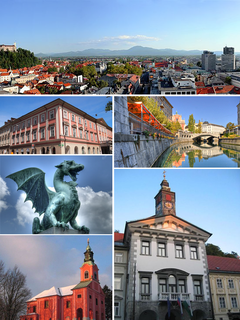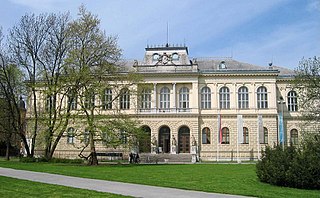
Technology is the result of accumulated knowledge and application of skills, methods, and processes used in industrial production and scientific research. Technology is embedded in the operation of all machines and electronic devices, with or without detailed knowledge of their function, for the intended purpose of an organization. The technologies of society consist of what is known as systems. Systems operate by obtaining an input, altering this input through what is known as a process, and then producing an outcome that achieves the intended purpose of the system.

Ljubljana is the capital and largest city of Slovenia. It is the country's cultural, educational, economic, political and administrative center.
The Jožef Stefan Institute is the largest research institute in Slovenia. The main research areas are physics, chemistry, molecular biology, biotechnology, information technologies, reactor physics, energy and environment. At the beginning of 2013 the institute had 962 employees, of whom 404 were PhD scientists.

Derrick de Kerckhove is the author of The Skin of Culture and Connected Intelligence and Professor in the Department of French at the University of Toronto, in Toronto, Ontario, Canada. He was the Director of the McLuhan Program in Culture and Technology from 1983 until 2008.

The Slovenian Academy of Sciences and Arts is the national academy of Slovenia, which encompasses science and the arts and brings together the top Slovene researchers and artists as members of the academy.
A virtual museum is a digital entity that draws on the characteristics of a museum, in order to complement, enhance, or augment the museum experience through personalization, interactivity, and richness of content. Virtual museums can perform as the digital footprint of a physical museum, or can act independently, while maintaining the authoritative status as bestowed by the International Council of Museums (ICOM) in its definition of a museum. In tandem with the ICOM mission of a physical museum, the virtual museum is also committed to public access; to both the knowledge systems imbedded in the collections and the systematic, and coherent organization of their display, as well as to their long-term preservation.
Technoculture is a neologism that is not in standard dictionaries but that has some popularity in academia, popularized by editors Constance Penley and Andrew Ross in a book of essays bearing that title. It refers to the interactions between, and politics of, technology and culture.
Science and technology in Germany has a long and illustrious history, and research and development efforts form an integral part of the country's economy. Germany has been the home of some of the most prominent researchers in various scientific disciplines, notably physics, mathematics, chemistry and engineering. Before World War II, Germany had produced more Nobel laureates in scientific fields than any other nation, and was the preeminent country in the natural sciences.

The Agence universitaire de la Francophonie is a global network of French-speaking higher-education and research institutions. Founded in Montreal, Quebec, Canada in 1961, as the Association des Universités Partiellement ou Entièrement de Langue Française (AUPELF), the AUF is a multilateral institution supporting co-operation and solidarity among French-speaking universities and institutions. It operates in French-speaking and non-speaking countries of Africa, the Arab world, Southeast Asia, North and South America and the Caribbean, Central, Eastern and Western Europe. As of 2020, the AUF has 1,007 members distributed throughout francophone countries on six continents. It is active in 119 countries, and represented by regional offices and information centers on campuses and in institutes. The Association receives funding from the Organisation internationale de la Francophonie (OIF), and its headquarters are located at the Université de Montréal, Quebec.

The Slovenian Museum of Natural History is a Slovenian national museum with natural history, scientific, and educational contents. It is the oldest cultural and scientific Slovenian institution.
The University Network of the European Capitals of Culture(UNeECC), an international non-profit association, was founded upon the initiative of the University of Pécs in Pécs, Hungary in December 2006 by 15 founding members.

Mirna is a nucleated village and a minor economic centre in central Lower Carniola, Slovenia. It is the largest settlement of the Mirna Valley and the seat of the Municipality of Mirna. It is situated at the crossing of regional roads and a confluence of several creeks with the Mirna River, along the railway line linking Sevnica and Trebnje.

Yaba College of Technology, popularly known as YABATECH, was founded in 1947, and is Nigeria's first higher educational institution. It is located in Yaba, Lagos. It has a student enrollment of over 16,000.
Ivo Šlaus is a nuclear and particle physicist and Distinguished Fellow of New Westminster College.
Anuška Ferligoj is a Slovenian mathematician, born August 19, 1947 in Ljubljana, Slovenia, whose specialty is statistics and network analysis. Her specific interests include multivariate analysis, cluster analysis, social network analysis, methodological research of public opinion, analysis of scientific networks. She is Fellow of the European Academy of Sociology.
Favorlang is an extinct Formosan language closely related to Babuza.
The Museum of Modern Art in Ljubljana, Slovenia, is the central museum and gallery of the Slovenian art works from the 20th and 21st centuries.

Marina Gržinić is a philosopher, theoretician and artist from Ljubljana. She is a prominent contemporary theoretical and critical figure in Slovenia. Since 1993 she is employed at the Institute of Philosophy at the Scientific and Research Center of the Slovenian Academy of Science and Arts. Today, she serves as a professor and research adviser. For her scientific work, she has received the Golden SASA sign in 2007. Since 2003, she has also served as Full Professor at the Academy of Fine Arts in Vienna, Austria. She publishes extensively, lectures worldwide, and is involved in video art since 1982.
The Cultural Centre of European Space Technologies (KSEVT) is the headquarters of an eponymous institute, promoting research in the fields of space culturalization. Moreover, it is the central cultural venue in Vitanje, where the family of Herman Potočnik Noordung, the spaceflight pioneer, originates from.
Open Technologies Alliance (GFOSS) is a Greek non-profit organization founded on February 28, 2008 by 36 Greek Universities and Research Institutes. GFOSS was created to "further the cause of Free, Open Source Software (FOSS) and Openness". 36 universities and research centers are shareholders of GFOSS.









